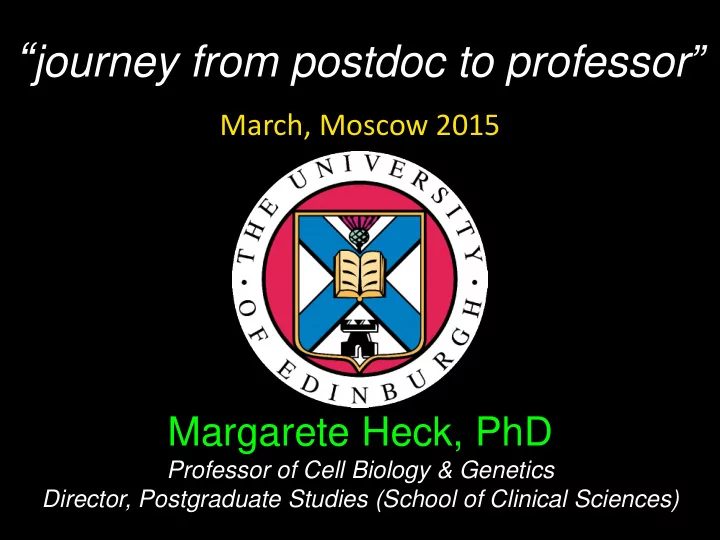

“ journey from postdoc to professor ” March, Moscow 2015 Margarete Heck, PhD Professor of Cell Biology & Genetics Director, Postgraduate Studies (School of Clinical Sciences)
Chromosome condensation and segregation in fly embryos Video of H2Av-GFP expressing fly embryo Ellada Savvidou
Born in Munich Moved to upstate New York at 6 weeks of age
…being in the right place at the right time
European Molecular Biology Laboratory Heidelberg, 1981-1982 Electron microscopy of chromatin
Johns Hopkins University School of Medicine Baltimore, 1983-1988 DNA topoisomerase II in chromosome structure and cell proliferation
Carnegie Institution of Washington Baltimore, 1988-1992 Replication origins used during DNA amplification Identification of lethal mutations in Drosophila
My postdoc lab, 1 st experience with the collegial “ Drosophila ” community Spradling Heck Nobel Prize Allan Spradling, Director CIW
Johns Hopkins University School of Medicine Assistant Professor of Cell Biology and Anatomy Baltimore, 1992-1995
Forward genetics: Mutations affecting nuclear & chromosome structure Reverse genetics: Identification and analysis of cohesin & condensin subunits
Prof Maurizio Gatti SAPIENZA Università di Roma Honorary Professor, Novosibirsk
University of Edinburgh College of Science & Engineering Wellcome Trust Senior Research Fellowship 1996-2005
University of Edinburgh College of Science & Engineering Wellcome Trust Senior Research Fellowship 1996-2005 College of Medicine & Veterinary Medicine Wellcome Trust University Award 2006-2011
@33 @36 @48 @18 @23 @28 Asst Prof WT SRF Prof Go to Univ Start PhD Start postdoc JHU UoE UoE @22 @29 @32 @34 @46 EMBL Married Charles Irina Moved colleges CSE CMVM
What do I love, and what do I dislike about my career? 1. With funding, ability to do 1. Paper rejection what YOU want to do 2. Grant rejection 2. Every day is different 3. Big egos/petty points 3. Stimulating 4. Feeling inferior 4. Challenging 5. The job is never done 5. Working as part of a team 6. It ’ s hard to get the time to 6. World-wide travel do the things you really need to be doing 7. (Small) modicum of international recognition 8. The belief you are contributing to knowledge
“ Alternative ” scientific careers • Medicine • Industry / Pharma • Public policy / ‘ think tanks ’ • Patent law • Tech transfer • Grants administration • Science communication • Publishing (scientific journals) • Lab manager / Research Centre manager
Some thoughts for PhD students… • Work hard then work harder • Don ’ t be shy, talk to people, get advice • Don ’ t reinvent the wheel! • Your postdoc lab is extremely important – what do YOU want to learn? Where? • Get out of your comfort zone try a new direction for your postdoc • Don ’ t be afraid to explore new avenues! • Don ’ t expect things to be handed to you on a silver platter
Go to seminars! • Don ’ t only attend those that you think are most directly relevant to your project • Help you to think “ outside the box ” • You may: – Find the science riveting – Take a wee nap – Discover an idea or technique relevant to what you do – Discover how NOT to give a research talk!
“ from postdoc to professor ” • Get feedback on manuscripts, and proposals • Recognition that you can say “ nyet ” • Stand up for yourself!Finding the right mentor – Formal schemes – or informal? – Should be somebody you respect and trust – Doesn ’ t have to be in the same research area – Doesn ’ t have to be the same gender – Feel comfortable to contact • Know the promotion process at your Univ
“ from postdoc to professor ” • Know the promotion process at your Univ – Grants count, papers count – But so does teaching – As does admin – Grants probably count most though… • Figure out what works for you (big lab, SME) • Women less likely to put themselves forward • Athena Swan initiatives (gender equality) • Promotion transparency – is it true? • There will always be ‘better’ game players…
Don ’ t do research unless you love it… • “ In the field of observation, chance favours only the prepared mind ” Louis Pasteur (1822-1895) • “ Science may set limits to knowledge, but should not set limits to imagination ” Bertrand Russell (1872-1970) • “ Discovery consists in seeing what everyone else has seen and thinking what no one else has thought ” Albert Szent-Gyorgi (1893-1986) • “ Only those who attempt the absurd will achieve the impossible ” MC Escher (1898-1972) • “ That ’ s curious ” Isaac Asimov (1920-1992)
Thank you!
Recommend
More recommend